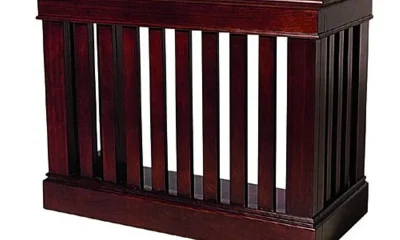Judiciary
Court strikes out forfeiture suit against Gov. Bello

A Federal High Court in Lagos on Wednesday, struck out an interim order of forfeiture, seeking to forfeit properties linked to Kogi State Governor, Yahaya Bello.
The suit was instituted through an exparte application brought by the Economic and Financial Crimes Commission, (EFCC), seeking a temporary order, forfeiting 14 properties associated with the Governor.
Delivering a ruling on the motion, on Wednesday, Justice Nicholas Oweibo, held that in view of Section 308 of the 1999 constitution, the EFCC lacks the power to initiate a criminal suit against an incumbent Governor or President.
Recall that Justice Oweibo, on Feb. 22, granted an interim forfeiture, following an exparte motion filed by the anti-graft agency, seeking to seize 14 properties located in Lagos, Abuja and the United Arab Emirates (UAE).
The Court had also directed EFCC to make publications in two national dailies for any interested parties to show cause why the order should not be made absolute.
Meanwhile, following publications of the preservative order, Gov. Bello had filed a Notice of Intention to oppose, as well as an application seeking to vacate the interim forfeiture order.
Bello premised his application on the grounds that the properties listed were not proceeds of an unlawful act, as they were acquired long before he was elected Governor.
He further stated that by Section 308 of the Constitution, the EFCC is prevented from instituting any civil or criminal suit against him.
Besides, he contested the illegality of the suit by EFCC on the grounds that the case was in flagrant disobedience to an existing order of a State High Court.
He averred that the order had restrained the EFCC from investigating any account of the Kogi State Government, pending the determination of the Motion on Notice.
On the issue of jurisdiction, the applicant stated that the properties listed were in Abuja, Kogi and UAE, while the personality involved is based in Lokoja.
He, therefore, averred that the suit ought to have been instituted either in Abuja or in Kogi State and consequently, urged the court to vacate the order for want of jurisdiction.
Responding to the applicant’s averment, counsel to EFCC, Mr Rotimi Oyedepo SAN, argued that the applicant had brought nothing before the court to convince the court to vacate the order.
He argued that contrary to the submissions of the applicant, the Kogi State High Court or any other court in Nigeria had not stopped the EFCC from carrying out its constitutional duties.
He argued the properties which include “Hotel Apartment Community, Burj Khalifa lying, being and situate at, Plot 160 Municipality NO 345-7562, Sky View Building No 1, Property No 401, Floor 4, Dubai U.A.E.,” were suspected to have been derived from unlawful activities.
Oyedepo had also asked the court to order the forfeiture of N400 million, which he said was also reasonably suspected to have been derived from unlawful activities.
In his ruling, however, Justice Oweibo held that, given Section 308 of the Constitution, which provides immunity to a serving governor from any civil or criminal prosecution, the court lacked jurisdiction to adjudicate on the matter.
The court consequently, struck out the suit for lack of jurisdiction.
Section 308 of the constitution provides: “No civil or criminal proceedings shall be instituted or continued against a person to whom this section applies during his period of office.”
Judiciary
Court discharges man accused of burning father’s house in Abuja

A Chief Magistrates’ Court in Bassa, Abuja, on Friday discharged a 28-year-old man, Hamza Azizz, who was accused of setting his father’s house on fire in Bassa Village.
The Chief Magistrate, Abdulrazaq Eneye, released the defendant after he had spent three weeks at the Kuje Correctional Center.
Eneye also ordered Azizz to undergo counselling and warned him against committing similar offences in the future.
“The court can now discharge you into society after assessing your mental state through the correctional center,” the magistrate ruled.
Azizz expressed remorse for his actions, pleaded for leniency, and vowed to stay away from drugs.
The prosecution counsel, Mr A. Aliyu, told the court that the defendant had poured kerosene on his father’s body before also dousing the house with kerosene and setting it ablaze.
The father later reported the incident to the police in Bassa Village.
Azizz was charged with mischief and criminal intimidation, offences that contravene Sections 327 and 397 of the Penal Code.
Judiciary
Nnamdi Kanu apologises over attacks on judge, others

Nnamdi Kanu, the leader of the proscribed Indigenous People of Biafra (IPOB), on Friday, tendered an apology over his recent attacks on the Federal High Court and Justice Binta Nyako.
Kanu, through his new counsel and former Attorney-General of the Federation (AGF) and Minister of Justice, Chief Kanu Agabi, SAN, also apologised to the Federal Government’s lawyer, Chief Awomolo, SAN.
The IPOB leader equally apologised to his team of lawyers earlier led by Aloy Ejimakor for also attacking them while before Justice Nyako.
Kanu tendered the apology through his lead counsel, Chief Agabi, before Justice James Omotosho, the new trial judge.
Upon resumed trial, Agabi sought the court’s permission to deliver a message on Kanu’s behalf.
He said he had already discussed the development with the lawyer to the prosecution and Justice Omotosho granted the application.
The News Agency of Nigeria (NAN) reports that Justice Omotosho had fixed March 21 for the trial of Kanu.
The judge fixed the date after the case file was transferred to him.
Kanu, who was brought back to the country in June 2021 from Kenya, was expected to take his plea as the case begins afresh (de novo).
NAN reports that the Chief Judge (CJ) of FHC, Justice John Tsoho, had, in a letter dated March 4 and addressed to Kanu’s lead counsel, Mr Aloy Ejimakor, communicated the re-assignment of the case from Justice Binta Nyako to Justice Omotosho.
The re-assignment followed the demand by Kanu and his team of lawyers for the transfer of the seven-count terrorism charge to another judge, after alleging bias.
Justice Nyako, on Sept. 24, 2024, withdrew from the case and sent the case file to the CJ of FHC for re-assignment.
The judge said she could not proceed with a trial where a defendant lacked confidence in the court.
However, the CJ sent Kanu’s case file back to Justice Nyako for adjudication, insisting that a formal application must be made by the defence before the recusal could be accepted.
But Kanu and Ejimakor, on Feb. 10, insisted that Justice Nyako no longer had jurisdiction to preside over the case after her recusal (withdrawal) from the matter, prompting the judge to adjourned the case indefinitely (sine die).
NAN reports that Justice Ahmed Mohammed (who has been elevated to Appeal Court) and Justice Tsoho (before becoming the CJ) had presided over Kanu’s trial before it was assigned to Justice Nyako, following the defendant’s rejection of the two judges.
Headlines
Supreme Court nullifies Rivers LG elections

The Supreme Court on Friday, nullified the Local Government election in Rivers State, which was conducted on Oct. 5, 2024.
A five-member panel of the apex court unanimously held that the election was conducted in violation of relevant laws.
Justice Jamilu Tukur, in the lead judgment, agreed with the appellant, the All Progressives Congress (APC), that conditions precedent were not complied with before the Rivers State Independent Electoral Commission (RSIEC) held the election.
Justice Tukur held that there was no evidence that the voters’ registration continued until 90 days before the election and that the requisite notices were issued as required by law.
-

 Headlines4 years ago
Headlines4 years agoFacebook, Instagram Temporarily Allow Posts on Ukraine War Calling for Violence Against Invading Russians or Putin’s Death
-

 Headlines4 years ago
Headlines4 years agoNigeria, Other West African Countries Facing Worst Food Crisis in 10 Years, Aid Groups Say
-

 Foreign3 years ago
Foreign3 years agoNew York Consulate installs machines for 10-year passport
-

 News1 year ago
News1 year agoZero Trust Architecture in a Remote World: Securing the New Normal
-

 Entertainment3 years ago
Entertainment3 years agoPhyna emerges winner of Big Brother Naija Season 7
-

 Headlines1 year ago
Headlines1 year agoNigeria Customs modernisation project to check extortion of traders
-

 Entertainment2 years ago
Entertainment2 years agoMovie download platform, Netnaija, announces closure
-

 Economy2 years ago
Economy2 years agoWe generated N30.2 bn revenue in three months – Kano NCS Comptroller












